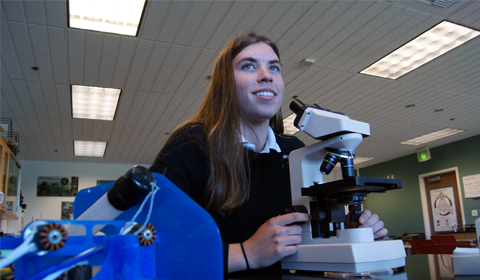
Photo by Chris Colthart.
Many Marlborough students have gone beyond the classroom with independent science projects like creating natural filtration systems, testing phytoplankton and writing textbooks. Students are able to pursue their interest in science not taught in the classroom with the help of a teacher supervisor but without the pressure of receiving credit for their work. Among these students are Talia ’16 and Kate ’16, Alex ’18, and Nicki ’16.
Talia and Kate spent two months writing a summary of everything they had learned in ninth grade biology for their final assignment of science instructor Jay Buckley’s class. The prompt was to provide a summary of everything they had learned in biology in some sort of format, such as a textbook or a storybook, with a particular age group in mind.
Talia and Kate chose to write the book for second and third graders who are beginners in biology. The girls divided up the sections, each girl taking the parts she understood better. Later, Talia and Kate came together to edit their work and develop a cohesive overall tone and style. Ultimately, their project became Biology in Life, a biology textbook for elementary school students. The book includes various chapters of three to five pages, including “Explain Science,” “Living Things,” “Ecology, Evolution, Plants,” “Systems and Genetics,” totaling 43 pages.
With the help of Coordinator of Community Outreach Miranda Payne and Science Department Chair Jennifer Garrison Ross, the two girls have spent the past year editing and perfecting their book.
Talia and Kate have yet to publish the book, but they hope to put their textbook to use at local elementary schools. Their primary goal is the implementation of the book into the Third Street Elementary curriculum.
This summer, Talia and Kate are interested in teaching an introductory biology class at Third Street Elementary or another elementary school in the area using the textbook.
“Over the summer, kids don’t want to be doing science, so we are going to try and think of fun ways to help them do science, but also play games,” Talia commented.
Kate expressed her concern for teaching the material in the textbook to younger kids.
“We learned this information in ninth grade, and we are about to turn around and teach it to kids who are much younger than that,” Kate added. “We have to simplify it a little bit and make sure that it is at a good level, so that it is not confusing, but at the same time it is not baseline boring.”
Meanwhile, other independent science projects are also in the works. Alex, for example, has started a project on oceanography in which she will be testing the effects of a natural filtration system versus an artificial filtration system. She worked with Buckley to come up with the project, and he will also be assisting her in the experiment. Many people argue that artificial filtration systems are not as good for the plants and animals, but it is impossible to create a natural filtration system. Alex is setting out to prove this wrong and create a natural system that works and will be better for the life within.
Alex expressed her interest in the ocean and what drew her to do this project.
“I’ve always really been interested in the ocean and the animals that live in the oceans and a way to have a little mini-oceans of your own and to have an aquarium,” Alex said.
Nicki plans to study plankton, microscopic, aquatic organisms that are a crucial food source for large aquatic animals, such as fish and whales. Nicki became interested in the project two summer ago when she began building underwater robots from a kit, even one with a camera. Her goal is to find a way to use the robots to help her study plankton.
Nicki had originally brought plankton to study in Los Angeles from a lake in Idaho, but that soon presented a problem: the plankton was dead and, therefore, not viable for testing. Garrison Ross then helped Nicki come up with the idea to grow her own phytoplankton in a lab. She plans on testing the effects of pH on the decreasing population of coral, which feeds on phytoplankton.
Nicki commented on the type of plankton she would want to grow.
“In the Maldives, they have these really cool bays at night. The plankton [are] bioluminescent, so the whole ocean looks neon blue,” Nicki shared. “I’m going to try and get that and see if it will glow.”
Garrison Ross expressed her joy in helping students with independent science projects.
“It’s nice to have the freedom to do things, you know there’s not a test on Wednesday and a lab on Thursday. It’s whatever they want it to be,” Garrison Ross shared. “This is more self-directed by the students, and I think that benefits them more, and it’s also more manageable for me.”





